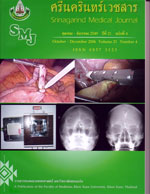Assessments of Pharmaceutical Care in Female-medical Ward in University Hospital
Abstract
Backgroud: Pharmaceutical care may provided the basic data to prevent or solve the problems of drug use in the ward.
Objective: The purposes of this study were : (1) to assess the frequencies and types of drug-therapy problems, (2) potential clinical impact score of pharmacist interventions and response of pharmacist recommendations, and (3) the outcome of the pharmacist discharge counseling.
Study design: Descriptive study.
Setting: Srinagarind Hospital, Faculty of Medicine, KhonKaen University.
Population and Samples: Patients admitted at female-medical ward between 1 January 2005 and 30 september 2005, were included.
Research tool and data collection: Patients’ data and drug used were reveiwed. If any drug-therapy problems were detected, pharmacist would coordinated with health care team and the patient for solving. All of the problems were classified and scored for their potential clinical impact by pharmacist. If the patients were prepared for discharge, pharmacist would evaluated the basic knowledge of patients and provided discharge counseling.
Analysis of data: Descriptive statistic. (frequency, percentage, mean±standard deviation)
Results: There were 340 drug-therapy problems occurring in 214 patients (23.46% of 912 patients). Most common type of the problems was improper dosage regimen
(Significance= 48.53%) (32.94%), untreated indication (10%) and failure to receive prescribed drug (10%). The majority of potential clinical impact score of pharmacist interventions was significance (48.53%). Their recommendations were received with high acceptance (89.22%). In the part of pharmacist discharge counseling, it was suggested that the average of patients’ knowledge on nature of disease was 52.76±29.70% and drug usage was 44.20±28.23%. Pharmacist could enable patients to gain knowledge about nature of disease (47.24±29.70%) and drug use (55.80±29.70%).
Conclusion: The pharmaceutical care in hospitalized patients can help identify, prevent and correct the problems. In addition, the knowledge of drug therapy in health-related personnels and patients could be enhanced by pharmacist. These will lead to improve quality care and treatment outcome of the patients.




